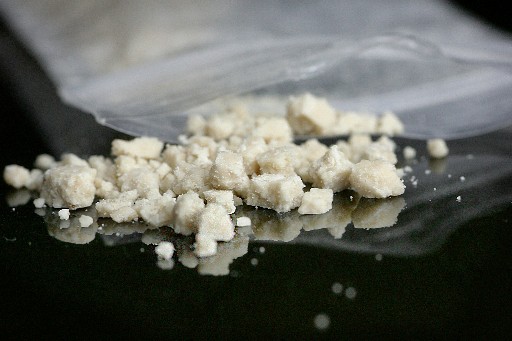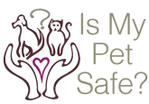Drugs: The Danger To Our Pets
Nearly tragic news out of Denver this week as reported by the local ABC affiliate, 7 NEWS Denver. A suspected drug dealer, while trying to escape the police, threw his stash of heroin over the fence of a doggy daycare center. A number of dogs thought those baggies must contain something tasty and one almost died as a result of ingesting the contents.

A Dangerous Combination
There are really two situations when it comes to pets and the recreational drugs used by humans. First, the accidental consumption of drugs, such as what occurred in Denver. Second, when pet parents and/or friends purposely give recreational drugs to their pets. Generally speaking, the dangers of the first can be minimized while the second is simply irresponsible, dangerous behavior by humans. Also falling under irresponsible pet parent behavior is failing to properly secure prescribed pain medications which are opioids.
This is not meant to be a lecture on whether recreational drugs are good or bad, for whom or when. However, those pet parents who do consume recreational drugs or take prescription pain medications must be aware of the hazards those drugs present to the pets that share their homes.
Accidental Ingestion
Marijuana
Marijuana is the most popular recreational drug and its use is widespread. Today's pot is not your daddy's either - concentrations of the active ingredient, THC, are far higher than in the 1960s, 80s or even 90s. So, even in its natural form, marijuana can be a concern if ingested by one of your pets - especially those with low body mass.
Though some pets may be tempted by an unattended bag of pot, few will hesitate when it comes to "edibles" left in their reach. Edibles range from the classic pot brownies, to cookies, to pretty much anything these days. Unlike people who, even under the influence, have a good idea of how much is too much, pets will not stop. If something tastes good they will eat whatever is available.
An intoxicated pet is unlikely to ask you to pass the Doritos. But they will have noticeable distress and some of the symptoms may be similar to those seen in humans, only enhanced. Examples are:
- Nervous anxiety, panting, and drooling
- Lethargy up to and including passing out
- Impaired balance
- Diarrhea, vomiting and loss of bladder control
- Trembling and shaking
- Sudden, unpredictable and possibly extreme response to noise and movement.
Impaired balance can be extremely dangerous to your pet. Falling down stairs can lead to sprains, broken bones or worse. A confused and anxious dog may also try to run around or jump up and down, again risking sprains or worse. And just as there are friendly and mean human drunks, your typically adorable loving pet may become mean and dangerous to you and others. A stoned pet on the loose in a neighbor hood could also result in another tragic police shooting.
If your pet is showing severe symptoms, a trip to the vet may be required. The treatment in most cases is to try to relieve anxiety by keeping the pet in a quiet location free from distractions. In some cases fluids may also be administered.
Though I am speaking here of marijuana in the recreational sense, the increased use of medical marijuana, like misplaced opioid pain killers, presents additional risk to pets.
Cocaine
If you suspect your pet may have ingested cocaine, seek immediate help from your vet or nearest urgent care center. Pets may lick residue left behind on tables or paraphernalia. They may also swallow small plastic bags containing the drug. The most common symptoms are:
- Drooling,
- dilated pupils,
- hyperactivity,
- trembling,
- rapid heart rate and respiration,
- seizures,
- heart attack,
- respiratory arrest,
- coma
Depending on how much cocaine has been ingested (and if it is still in bags), your vet may induce vomiting. If not, endoscopy may be used to remove as much of the drugs from the stomach as possible. Because it is impossible to know what cocaine has been cut with, your pet will need to be closely monitored and other treatments, including intravenous fluids and opiate reversal agents, may be required.
Amphetamines (aka Meth)
Meth is a highly addictive drug and its use is widespread, especially in rural areas. Like cocaine, amphetamines affect the central nervous system and can result in extremely dangerous reactions in your pet. Amounts as little as 0.6mg per pound of body weight have caused death in dogs (a typical 25mg dose of meth could cause death in a pet weighing less than 40 pounds) Common symptoms include:
- increased heart and respiration rates,
- erratic heart beat
- drooling
- overheating (hyperthermia)
- dilated pupils
- trembling, seizures
Pet parents should NOT induce vomiting unless specifically told to do so by a vet. Seek immediate urgent care help. Treatment is likely to include the administering of a dopamine antagonist to counteract the effects of the amphetamines.
Heroin and other opioids
I think everyone knows that heroin can be lethal. In fact, it is often not the heroin that kills junkies but rather the other drugs used to cut the heroin (often tranquilizers for large animals or the surgical pain medication fentanyl). However, heroin is but one of many opiates. Many pet parents may have pain medications such as hydrocodone and percocet in their homes that are every bit as potentially lethal as street heroin to our pets. If you think your pet has ingested an opioid, check for these symptoms:
- Vomiting,
- Pinpoint pupils (dogs),
- Dilated pupils (cats),
- Severe sedation,
- Reduced heart and respiratory rate,
- Coma,
- Respiratory arrest
Please note the difference in pupil reaction between dogs and cats! Pet parents should get their pet to a vet or urgent care center immediately where a dose of naloxone can be administered. Naloxone counteracts the effects of opioids. If you know your pet has ingested opiods but is not yet showing symptoms (perhaps because they swallowed a plastic bag), the medical professionals will try to decontaminate your pet by removing the drugs from their stomach.
Analysis
At the end of the day, drugs (and alcohol) are not going away. They have been used recreationally for centuries and pharmacueticals today are able to improve the lives of many in chronic pain. At the same time, more than ever in the past pets are an integral part of our households and lives. Without foresight, tragedy can and will occur. IMPS implores all pet parents to keep all recreational drugs out of reach of their pets and to make sure pain killers are stored in a safe place and to make sure they find any tablets dropped accidentally on the floor.


